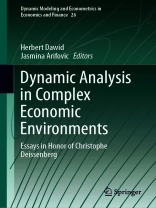This book analyses decision-making in dynamic economic environments. By applying a wide range of methodological approaches, combining both analytical and computational methods, the contributors examine various aspects of optimal firm behaviour and relevant policy areas. Topics covered include optimal control, dynamic games, economic decision-making, and applications in finance and economics, as well as policy implications in areas such as pollution regulation.
This book is dedicated to Christophe Deissenberg, a well-known and distinguished scholar of economic dynamics and computational economics. It appeals to academics in the areas of optimal control, dynamic games and computational economics as well as to decision-makers working in policy domains such as environmental policy.
Innehållsförteckning
Chapter 1 “Introduction” by Herbert Dawid and Jasmina Arifovic.- Chapter 2. “Cross-bidding in e Bay-like Environments” by Francisco Alvarez and Marcello Sartarelli.- Chapter 3. “Risk–Reward Ratio Optimisation (Revisited)” by Manfred Gilli and Enrico Schumann.- Chapter 4. “Optimal Investment-Consumption Decisions with Partially Observed Inflation: A Discrete Time Formulation” by Alain Bensoussan and Suresh P. Sethi.- Chapter 5. “Dynamic Games of Common-Property Resource Exploitation when Self-Image Matters” by Ngo van Long.- Chapter 6. “The Effects of Political Short-termism on Transitions Induced by Pollution Regulations” by Giovanni Di Bartolomeo, Enrico Saltari and Willi Semmler.- Chapter 7. “Capital Control, Exchange Rate Regime and Monetary Policy: Indeterminacy and Bifurcation” by William A. Barnett and Jingxian Hu.- Chapter 8. “A Multi-Agent Methodology to Assess the Effectiveness of Alternative Systemic-Risk
Adjusted Capital Requirements” by Andrea Gurgoneand Giulia Iori.- Chapter 9. “The Role of (De-)Centralized Wage Setting for Industry Dynamics and Economic Growth: An Agent-Based Analysis with the Eurace@Unibi Model” by Herbert Dawid, Philipp Harting and Michael Neugart.- Chapter 10. “Oracle & Interactive Computations, Post-Turing Thesis & Man-Machine Interactions” by K.Vela Velupillai .Om författaren
Herbert Dawid is Professor of Economic Theory and Computational Economics at the Bielefeld University, Germany.
Jasmina Arifovic in Professor of Economics at the Simon Fraser University, Canada.












